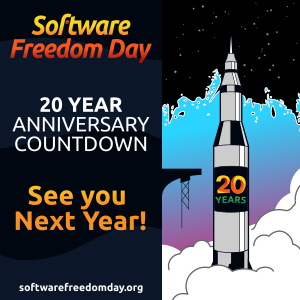skip to main |
skip to sidebar
 The Michigan Library Consortium has selected the open source Evergreen product for their statewide integrated library system, and has also signed with Equinox Software to manage the implementation.
The Michigan Library Consortium has selected the open source Evergreen product for their statewide integrated library system, and has also signed with Equinox Software to manage the implementation.
Beginning with a pilot project including three libraries (expected to go live over the summer), Michigan Evergreen will be offered to other consortium libraries later.
 Michigan Evergreen is similar to the pioneering Georgia PINES project, a project currently underway in British Columbia, and another statewide project beginning in Indiana.
Michigan Evergreen is similar to the pioneering Georgia PINES project, a project currently underway in British Columbia, and another statewide project beginning in Indiana.
The award-winning Evergreen software is important in many ways-- it allows libraries to take control of their systems in many new ways, for example. But as a consortial product, it is also driving libraries to the realization that in today's market, shared systems can make an unbeatable business case.
 On my commute home last night I listened to an Educause podcast from Scott Kirsner's keynote at NERCOMP 2008 entitled "What Innovators Can Learn From Hollywood".
On my commute home last night I listened to an Educause podcast from Scott Kirsner's keynote at NERCOMP 2008 entitled "What Innovators Can Learn From Hollywood".
Since there was a lot of traffic, I had plenty of time to think about what he was saying-- basically how the many technical changes in the movie business have succeeded (when they have succeeded) in the face of stiff resistance from people who were comfortable with the established tools (indeed who were often geniuses in their use).
Advocates of new technologies usually underestimated how long change would take (Technicolor was introduced in 1917 and took decades to succeed in the market). On the other hand, sometimes even the imagination of technology boosters falls short. When The Jazz Singer" introduced the concept of talking pictures, it was thought of as a niche technology for musicals. Dramas, comedies, and other films worked fine as silent films-- a whole generation of actors and film makers had created an expressive and often beautiful body of work without muddying up the visual with sounds. Why would anyone need to add a soundtrack?
I'd never thought of it before, but the real revolutionary thing was not so much the invention of the capability of making talking pictures as it was that the market quickly decided it only wanted talking films. And in a year or two, that's all that was being produced.
Which leads me to consider the library business today. We're on the verge of an age of pervasive, free access to the digitized contents of the million books being processed by Google, the Open Content Alliance, and others. In this kind of world, how many libraries need to duplicate this access in print? Will electronic access be enough? Will print become the niche market? This "Million Books Problem" is getting a lot of attention in library circles today.
The key question is will this technology take decades to become the norm, or just a few years? I've been thinking we'd have a comfortable number of years to adapt to changing demands, but what if we don't?

In response to my question, Peter Brantley has added a comment about what Innovative Interfaces said when deciding to "abstain" instead of supporting the Berkeley Accord on a standard discovery layer for integrated library systems:
"We generally agree with the comments expressed by our colleagues that there is a significant amount of work involved in fully describing the details of a meaningful interoperabilty mechanism between ILS and discovery. At the same time, we feel that expressing a position on the proposal without the benefit of fully understanding such details is premature. As a result, we respectfully abstain from commenting on the proposal at this time."
Betsy Graham of Innovative has noted in a blog post that III's abstention ended with the phrase, “We look forward to hearing more on this proposal in the near future.”
Innovative is apparently claiming that it's too early in the process for them to participate, and that they will wait for others to do more work before joining.
I guess I don't see how it is in their long-term interest to be the one major vendor not supporting the eventual interoperability standard. So if they do plan on supporting it later, the question becomes just how long they feel that it's better to let their competitors shape it without their input?

The Digital Library Federation (DLF) has announced (through the blog of DLF Executive Director Peter Brantley) details of the progress towards creating a discovery API for library automation systems.
For a generation now libraries have been amassing data in our integrated library systems using a mix of proprietary technology from the vendor community and our own arcane standards. For years now this value-added "stuff" has been locked away from the public Internet (and our patrons) in data "silos".
Last year the DLF put together an ILS-Discovery Interface Task Force to work out a way to expose library ILS data to Internet searches. The resulting proposed API (application programming interface) would use standard, open protocols and technologies to provide a common means to harvest bibliographic content and holdings information as well as provide a stable URL link to ILS records.
Last month the task force secured the support of most of the major vendors in the library market, with the notable exception of Innovative Interfaces (which abstained) to a document which they are calling the Berkeley Accord (after the location of the meeting at the Faculty Club at UC Berkeley).
Here are the ten signatories: - Talis
- Ex Libris
- LibLime
- BiblioCommons
- SirsiDynix
- Polaris Library Systems
- VTLS
- California Digital Library
- OCLC
- AquaBrowser
If this project succeeds, it will rank with the creation of the MARC standard in its importance to libraries.
As long as library data falls short of full access from Internet discovery, we will be an extra step away from our patrons, many of whom will not take it.
It reminds me of the rail system in Los Angeles, which stops several miles short of the airport, leaving customers to take a bus the rest of the way, and providing a big opening for the airport shuttle business. We have competitors, too!
(Thanks to Eric Lease Morgan and the NGC4LIB listserv for spreading the news!)
 Hewlett-Packard has announced its entry in the growing student laptop market-- the Mini-Note.
Hewlett-Packard has announced its entry in the growing student laptop market-- the Mini-Note.
A direct competitor to the Eee PC from Assus, and maybe student laptops like the OLPC XO or the Intel Classmate, the Mini-Note will be offered with either various flavors of Microsoft Windows Vista or SUSE Linux Enterprise Desktop, in prices ranging from US$499 to $849. Base models will come with 4 GB flash drives, pricier models will get 120-160 GB hard drives. All will come with 8.9 inch displays, wireless access, web cams, and VIA C7 processors.
It's great to see this market heating up-- if the OLPC folks started the world thinking about this market, the success of the Eee PC has shown there's money to be made here. The entry of a big player like HP is good news-- getting more of these into the hands of more students will take us one step closer to a transition to e-textbooks.

The Santa Cruz Library System in California announced they have selected the open source Koha Zoom integrated library system to replace their aging DRA Web 2 ILS. Working with Koha support vendor LibLime, the SCPL expects their new system to go live in the Fall of 2008.
The SCPL has a central library and nine branches, with an annual circulation of about 2 million items.

Hundreds of other libraries will face the choice of how to replace their aging, dead-ended proprietary ILSs over the next few years, and congrats to the SCPL for choosing an open source solution!
 The Michigan Library Consortium has selected the open source Evergreen product for their statewide integrated library system, and has also signed with Equinox Software to manage the implementation.
The Michigan Library Consortium has selected the open source Evergreen product for their statewide integrated library system, and has also signed with Equinox Software to manage the implementation.









